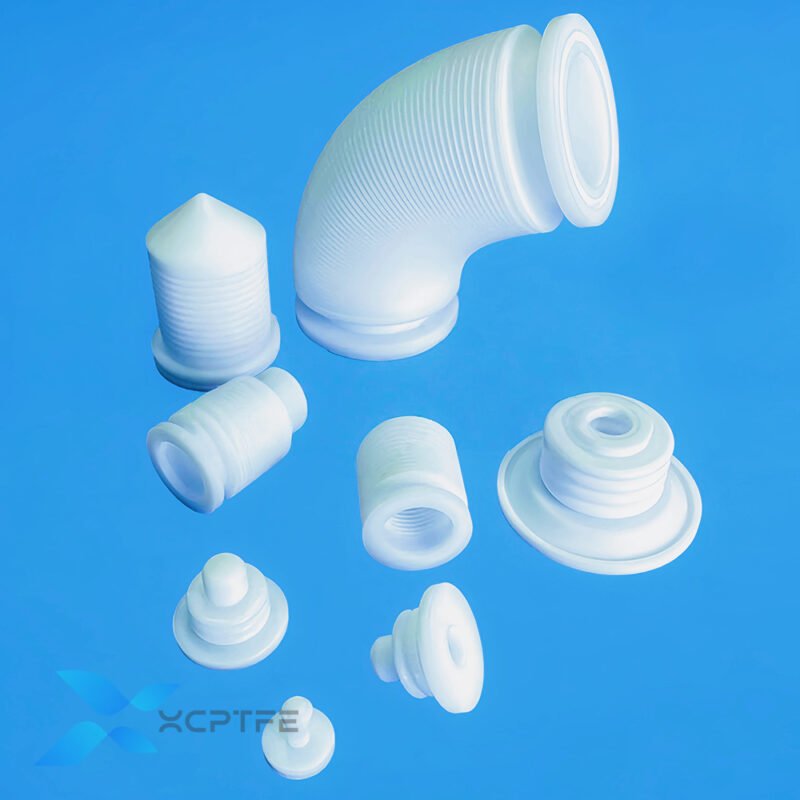Custom PTFE Spring-Loaded Seal for Demanding Applications
- Resistant to all strong acids, alkalis, oxidants and organic solvents including hydrofluoric acid.
- Smooth surface, extremely low friction coefficient, not adhere to any substances, easy to clean.
- Long time working temperature between -200°C and +260°C. Short working time at 300°C
- High purity & not contaminate experimental samples.
- Soft texture, good toughness, not easy to break but cutting and scratching.
Item No.: C5924174
Description
We specialize in the design and manufacture of high-performance custom PTFE Seal solutions to meet the most challenging operational requirements. Our expertise encompasses a wide range of products, from standard PTFE Gasket and PTFE O-Ring components to advanced spring energized seal systems.
The exceptional properties of PTFE (polytetrafluoroethylene), including chemical inertness, a wide temperature range, and extremely low friction, make it ideal for critical applications. For extreme conditions, our spring-loaded seal designs provide superior performance by maintaining constant sealing force against the shaft or bore, even under thermal expansion or dynamic pressure variations.
Our custom seals are engineered for reliability across diverse industries. They are critical in the aerospace sector for fuel and hydraulic systems, ensure purity in food grade and pharmaceutical processes, and resist aggressive media in chemical processing. Furthermore, their low outgassing properties make them the preferred choice for high vacuum environments.
By collaborating with us, you access tailored sealing solutions that enhance equipment longevity, reduce downtime, and optimize performance. Contact our engineering team to discuss your specific application needs.
Precautions:
Mechanical protection (anti creep&anti wear)
Adequate support is necessary: PFA pipes are softer than metal, and the support spacing should be shorter to prevent sagging and deformation.
Strictly prohibit over tightening: When connecting flanges, a torque wrench must be used and tightened evenly in diagonal order. Excessive tightening can lead to material “cold flow” (permanent deformation), resulting in leakage.
Pay attention to wear resistance: When transporting fluids containing solid particles, high flow rates can erode and wear the pipe wall. Wear resistance needs to be evaluated, and if necessary, thicker wall pipes or more wear-resistant materials should be selected.
Hot operation (anti decomposition&anti deformation)
Must be hot bent: PFA pipes must be uniformly heated to a soft and transparent temperature (approximately 200 ° C) using a hot air gun before bending. Cold bending is strictly prohibited, otherwise it may crack or collapse.
Open flame taboo: It is strictly prohibited to use open flames during heating, otherwise it will cause local overheating and lead to material decomposition and deterioration.
High temperature pressure reduction: PFA’s mechanical strength will decrease at high temperatures (such as>150 ° C). The system operating pressure should be reduced according to the temperature pressure curve, and room temperature pressure rating should not be used at high temperatures.
Installation specifications (stress prevention&sealing protection)
Smooth incision: A specialized pipe cutter is required to cut the pipeline, ensuring that the incision is smooth, vertical, and free of burrs. Rough incisions are the starting point of stress cracking.
Compensating for thermal expansion: PFA has a high coefficient of thermal expansion, which is more than 10 times that of metals. The pipeline system must be designed with expansion joints, U-bends, or flexible hoses to absorb thermal displacement and prevent damage to equipment interfaces.
Safety and Compatibility (Leak Prevention&Security Protection)
Good ventilation: PFA will decompose and release highly toxic smoke at extremely high temperatures (>300 ° C). All hot processing (such as hot melt welding) must be carried out in a well ventilated area.
Confirm compatibility: Although PFA is resistant to the vast majority of chemicals, it is still necessary to confirm its compatibility with specific chemical media in your process, especially at high temperatures.
Purity control (pollution prevention)
Clean installation: For high-purity applications such as semiconductors and pharmaceuticals, it is necessary to keep the interior of the pipeline clean during the installation process to avoid external contamination caused by gloves, tools, etc. After installation, cleaning and testing should be carried out.
Adequate support is necessary: PFA pipes are softer than metal, and the support spacing should be shorter to prevent sagging and deformation.
Strictly prohibit over tightening: When connecting flanges, a torque wrench must be used and tightened evenly in diagonal order. Excessive tightening can lead to material “cold flow” (permanent deformation), resulting in leakage.
Pay attention to wear resistance: When transporting fluids containing solid particles, high flow rates can erode and wear the pipe wall. Wear resistance needs to be evaluated, and if necessary, thicker wall pipes or more wear-resistant materials should be selected.
Hot operation (anti decomposition&anti deformation)
Must be hot bent: PFA pipes must be uniformly heated to a soft and transparent temperature (approximately 200 ° C) using a hot air gun before bending. Cold bending is strictly prohibited, otherwise it may crack or collapse.
Open flame taboo: It is strictly prohibited to use open flames during heating, otherwise it will cause local overheating and lead to material decomposition and deterioration.
High temperature pressure reduction: PFA’s mechanical strength will decrease at high temperatures (such as>150 ° C). The system operating pressure should be reduced according to the temperature pressure curve, and room temperature pressure rating should not be used at high temperatures.
Installation specifications (stress prevention&sealing protection)
Smooth incision: A specialized pipe cutter is required to cut the pipeline, ensuring that the incision is smooth, vertical, and free of burrs. Rough incisions are the starting point of stress cracking.
Compensating for thermal expansion: PFA has a high coefficient of thermal expansion, which is more than 10 times that of metals. The pipeline system must be designed with expansion joints, U-bends, or flexible hoses to absorb thermal displacement and prevent damage to equipment interfaces.
Safety and Compatibility (Leak Prevention&Security Protection)
Good ventilation: PFA will decompose and release highly toxic smoke at extremely high temperatures (>300 ° C). All hot processing (such as hot melt welding) must be carried out in a well ventilated area.
Confirm compatibility: Although PFA is resistant to the vast majority of chemicals, it is still necessary to confirm its compatibility with specific chemical media in your process, especially at high temperatures.
Purity control (pollution prevention)
Clean installation: For high-purity applications such as semiconductors and pharmaceuticals, it is necessary to keep the interior of the pipeline clean during the installation process to avoid external contamination caused by gloves, tools, etc. After installation, cleaning and testing should be carried out.

